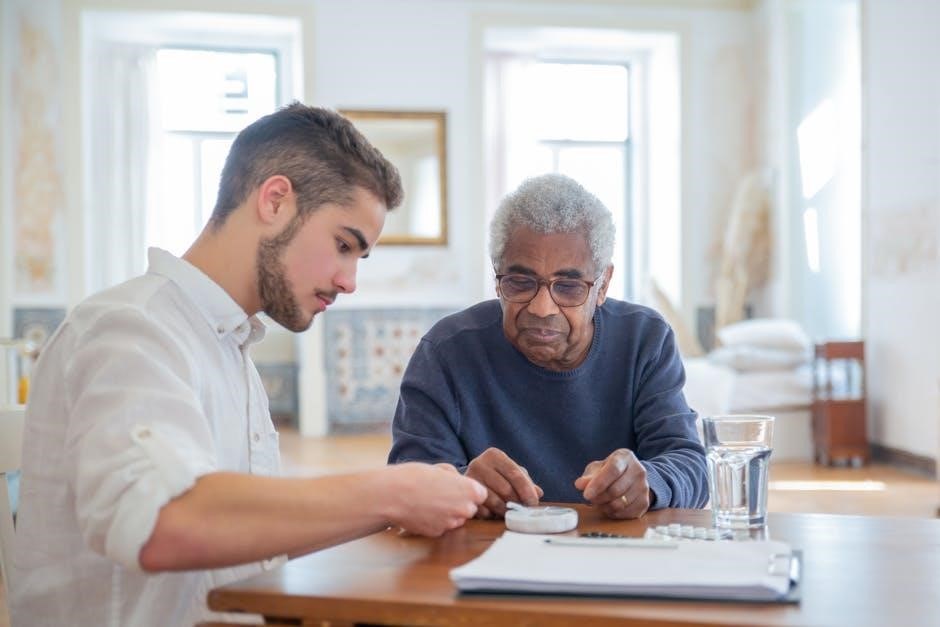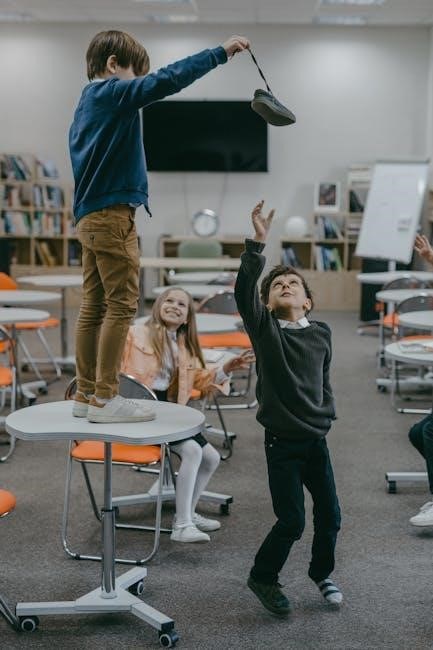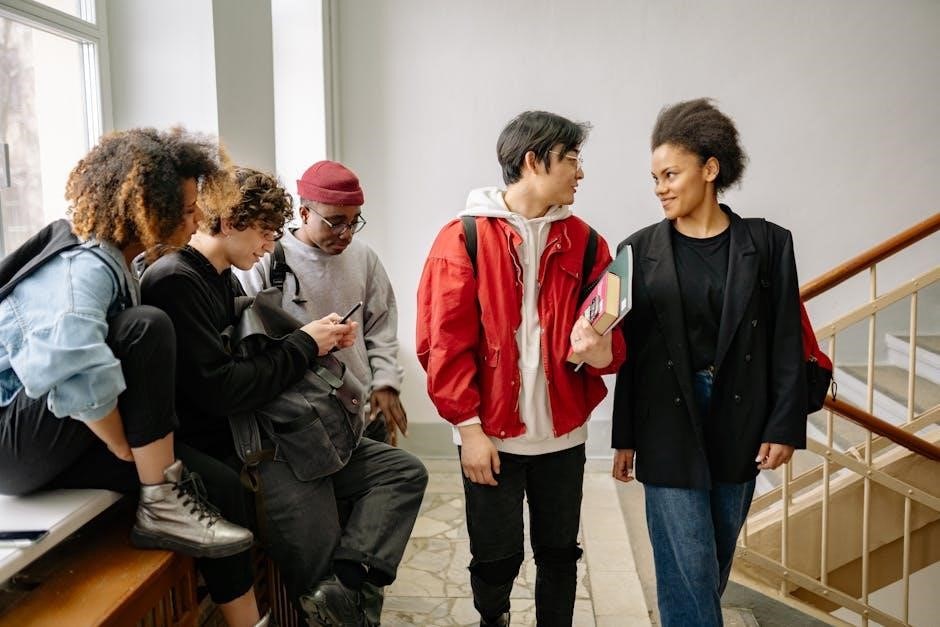Social Learning Theory, developed by Albert Bandura, explains how individuals acquire behaviors, attitudes, and knowledge by observing and imitating others in a social context.
1.1 Overview of Bandura’s Social Learning Theory
Bandura’s Social Learning Theory, also known as Social Cognitive Theory, emphasizes that learning occurs through observation, modeling, and imitation of others’ behaviors. It combines principles of classical and operant conditioning with cognitive processes, suggesting that people learn by observing outcomes of others’ actions and internalizing these behaviors. This theory highlights the role of observation and cognitive processes in shaping behavior, differing from traditional conditioning theories by incorporating mental processes and social interactions.
1.2 Key Concepts and Principles
Bandura’s Social Learning Theory centers on key concepts like observational learning, modeling, self-efficacy, and reciprocal determinism. It suggests that behavior is shaped by observing others, imitating actions, and understanding the consequences of those actions. The theory also emphasizes the role of cognitive processes, such as attention and memory, in learning. These principles form the foundation of how individuals acquire and maintain behaviors in social environments.
Theoretical Framework
Bandura’s Social Learning Theory integrates observation, environment, cognition, and behavior, emphasizing how individuals learn by observing others and interacting with their surroundings. It also highlights the role of self-efficacy and reciprocal determinism in shaping behaviors.
2;1 Observational Learning and Modeling
Observational learning, a key concept in Bandura’s theory, occurs when individuals acquire new behaviors by observing and imitating others. Modeling involves demonstrating behaviors, which observers then replicate. This process is influenced by the observer’s attention, retention, and motivation, as well as the model’s status and consequences of their actions, shaping learning effectively.
2.2 Reciprocal Determinism
Reciprocal determinism, a central idea in Bandura’s theory, describes the dynamic interaction between personal factors, behavior, and environmental influences. It emphasizes that behavior is shaped by these three elements, which continuously influence one another, creating a bidirectional relationship. This concept highlights the complexity of learning, where individuals and their environments mutually affect each other.
2.3 The Role of Self-Efficacy
Self-efficacy, a key concept in Bandura’s theory, refers to an individual’s belief in their ability to succeed in specific situations. It influences motivation, behavior, and persistence. High self-efficacy enhances learning and performance, while low self-efficacy can hinder achievement. Bandura emphasizes that self-efficacy arises from direct experiences, observations, and social interactions, shaping how individuals approach challenges and goals.

Key Components of Social Learning
Social learning involves attention, retention, and replication of observed behaviors. It emphasizes the cognitive processes underlying observation, imitation, and the motivational factors driving learning through social interactions.
3.1 Attention andRetention
3.1 Attention and Retention
Attention and retention are critical components of Bandura’s Social Learning Theory. Attention involves focusing on specific behaviors or actions, while retention refers to the ability to store and recall observed behaviors. These processes enable individuals to replicate and adapt behaviors, emphasizing the cognitive aspects of learning through observation and imitation.
3.2 Replication and Motivation
Replication involves the actual performance of observed behaviors, influenced by motivation. Bandura’s theory highlights that individuals are more likely to replicate actions when they observe positive outcomes or reinforcements. Motivation stems from perceived rewards, personal satisfaction, or self-efficacy, driving the likelihood of imitating and maintaining learned behaviors over time.
The Bobo Doll Experiment
Bandura’s Bobo Doll Experiment showed children imitating aggressive adult behavior, demonstrating how observational learning significantly influences behavior acquisition and aggression in individuals thereby.
4.1 The Experiment’s Design
Bandura’s experiment involved children observing an adult model behaving aggressively toward a Bobo doll. Some children saw the model rewarded, others saw punishment, and some saw no consequences. The setup allowed Bandura to study how observation and reinforcement influence imitation, providing clear evidence for social learning principles in behavior acquisition.
4.2 Implications for Learning Theory
Bandura’s Bobo Doll experiment challenged traditional behaviorist views, demonstrating that learning occurs through observation and reinforcement. It showed that individuals can acquire behaviors without direct rewards or punishments, highlighting the role of social and environmental factors. This supported Bandura’s Social Learning Theory, emphasizing observation and modeling as key mechanisms in behavior acquisition and aggression.
Applications of Social Learning Theory
Social Learning Theory is applied in education, psychology, and criminal behavior, enhancing teaching methods, behavior modification, and understanding aggression through observational learning principles.
5.1 Education and Learning
Social Learning Theory significantly influences education by emphasizing observation and modeling. Students learn by observing teachers and peers, fostering skill acquisition and behavioral development.
Educators use this theory to design strategies that capture attention, promote retention, and encourage replication of desired behaviors, enhancing overall learning outcomes and student engagement in academic settings.
5.2 Psychology and Behavior Modification
Social Learning Theory is widely applied in psychology to modify behaviors. By observing models and experiencing reinforcement, individuals can adopt positive behaviors and reduce negative ones. Techniques like modeling and reinforcement are used to treat phobias, aggression, and other disorders, demonstrating the theory’s practical value in psychological interventions and behavior change. It emphasizes self-efficacy and observational learning in therapeutic settings.
5.3 Criminal Behavior and Aggression
Bandura’s Social Learning Theory explains that criminal behavior and aggression are often learned through observation and imitation of violent models. Exposure to aggressive behaviors, combined with reinforcement or lack of punishment, can lead to the adoption of similar conduct. The theory highlights the role of environmental factors and reciprocal determinism in shaping criminal tendencies, emphasizing the interplay between behavior, environment, and personal factors.

The Role of Reinforcement
Reinforcement, a key concept in Bandura’s theory, strengthens behaviors through positive or negative consequences, shaping learning and encouraging repetition of observed actions.
6.1 Positive and Negative Reinforcement
Positive reinforcement involves rewards that increase behavior likelihood, while negative reinforcement removes unpleasant stimuli to encourage actions. Both mechanisms, as per Bandura, effectively shape behavior in social learning contexts, influencing how individuals adopt observed behaviors based on their outcomes and environmental responses.
6.2 Punishment and Its Effects
Punishment in Bandura’s theory reduces undesired behavior through negative outcomes. While effective, it may not necessarily eliminate the behavior, as individuals can suppress actions to avoid punishment rather than fully understand their inappropriateness, potentially leading to temporary compliance without true learning or behavior change.
The Role of the Environment
The environment significantly influences learning by providing opportunities for observation and modeling. Social contexts and environmental cues shape behavior, reinforcing or discouraging specific actions through external factors.
7.1 Environmental Factors in Learning
Environmental factors play a crucial role in shaping behavior through observation and modeling. Social cues, contexts, and the presence of models influence learning. The environment provides opportunities for individuals to observe and imitate behaviors, with reinforcement or punishment acting as key mechanisms. Bandura’s theory emphasizes how external stimuli and social interactions guide behavioral acquisition and modification.
7.2 Social Context and Observational Learning
Social context significantly influences observational learning, as individuals learn by observing others in their environment. The presence of models and their behaviors, along with the outcomes they experience, shape an observer’s understanding and adoption of new actions. Bandura’s theory highlights how social interactions and contextual cues enhance learning, making it a dynamic and adaptive process.
The Role of Self-Regulation
Self-regulation involves individuals controlling their own behavior through goal-setting, self-monitoring, and self-reinforcement, enabling them to maintain behaviors even without external rewards or pressures.
8.1 Self-Regulatory Processes
Self-regulatory processes involve mechanisms like self-monitoring, self-evaluation, and self-reinforcement, enabling individuals to control their actions and thoughts. These processes help people set goals, assess progress, and maintain motivation, fostering independence from external rewards and enhancing self-efficacy, as outlined in Bandura’s theory.
8.2 The Development of Self-Regulation
The development of self-regulation begins with observing models and internalizing their behaviors, leading to the formation of self-efficacy. Individuals progress from relying on external feedback to internal self-regulatory mechanisms, enabling them to control their actions and thoughts independently. This maturation process is influenced by observational learning and the gradual mastery of self-monitoring and self-evaluation skills.
The Role of Imitation
Imitation is a fundamental aspect of learning, as individuals replicate observed behaviors, attitudes, and emotional responses, shaping their own actions and understanding of social norms.
9.1 Imitation in Learning
Imitation plays a crucial role in learning as individuals observe and replicate behaviors, attitudes, and emotional responses. Bandura’s theory highlights that through imitation, learners acquire new skills and internalize social norms. This process is enhanced by observing models, with learners often mimicking actions they find meaningful or rewarding. Imitation bridges observation and practice, fostering cognitive and behavioral development.
9.2 The Role of Models
Models are central to Bandura’s Social Learning Theory, as they provide observable behaviors and outcomes. Effective models, particularly those perceived as competent or prestigious, influence learners by demonstrating actions and consequences. Through observing models, individuals gain insights into appropriate behaviors, attitudes, and problem-solving strategies, which they can then imitate and adapt to their own contexts, facilitating learning and behavior change.
The Role of Cognition
Cognition plays a crucial role in interpreting and processing observed behaviors, influencing how individuals perceive and apply learned actions in various social contexts effectively.
10.1 Cognitive Processes in Learning
Cognitive processes, such as attention, memory, and problem-solving, are essential in Bandura’s Social Learning Theory. These mental functions enable individuals to interpret and store observed behaviors, facilitating the replication of actions and the development of new skills through thoughtful processing and understanding of social interactions and their consequences.
10.2 The Role of Thought in Behavior
Bandura’s theory highlights the role of thought in shaping behavior, emphasizing how cognitive processes like self-efficacy and goal-setting influence learning. Thoughts guide observations, interpretations, and decisions, enabling individuals to evaluate and replicate behaviors based on their anticipated outcomes, underscoring the mind’s active role in social learning and behavioral adaptation.

The Role of Emotional Responses
Emotional responses significantly influence learning, as individuals are more likely to replicate behaviors that evoke positive emotions and avoid those linked to negative outcomes.
11.1 Emotional Responses in Learning
Emotional responses play a crucial role in learning, as they influence an individual’s motivation and willingness to replicate observed behaviors. Positive emotions enhance learning by fostering engagement, while negative emotions may deter it. Bandura’s theory highlights how emotional arousal, such as excitement or fear, increases the likelihood of observing and imitating behaviors, shaping cognitive and behavioral outcomes effectively.
11.2 The Role of Emotional Arousal
Emotional arousal significantly impacts learning, as heightened emotional states enhance the perception and retention of observed behaviors. Bandura’s theory suggests that emotional responses, such as excitement or fear, amplify the influence of modeled actions. This emotional connection increases the likelihood of imitation, as individuals are more inclined to replicate behaviors that evoke strong emotional reactions, shaping their cognitive and behavioral processes effectively.

The Role of Vicarious Learning
Vicarious learning occurs through observing others’ behaviors and their consequences, enabling individuals to acquire knowledge and skills without direct experience or reinforcement, shaping their actions effectively.
12.1 Learning Through Observation
Learning through observation is a cornerstone of Bandura’s theory, where individuals acquire knowledge and behaviors by watching others. This process involves attention, retention, and replication of observed actions, emphasizing the role of models and their outcomes in shaping behavior without direct reinforcement, thus highlighting the power of vicarious learning in social contexts effectively.
12.2 The Role of Symbols and Language
Symbols and language play a crucial role in Bandura’s theory, enabling individuals to encode and recall observed behaviors. Language facilitates cognitive processing, allowing learners to form mental models and communicate abstract ideas. It also enhances self-regulation by enabling individuals to guide their behavior through self-instructions, thus expanding the scope of learning beyond direct observation and reinforcement in complex social settings effectively.
Social Learning Theory profoundly influences understanding of human behavior, emphasizing observation and modeling. Its applications span education, psychology, and behavior modification, guiding future research and practical interventions effectively.
13.1 Summary of Key Points
Social Learning Theory, developed by Albert Bandura, emphasizes observation, modeling, and imitation as primary mechanisms of learning. It highlights reciprocal determinism, self-efficacy, and environmental factors in shaping behavior. The theory underscores the role of cognition and emotional responses, providing a comprehensive framework for understanding human behavior and its applications in education, psychology, and behavior modification, as supported by empirical research and practical interventions.
13.2 Implications for Future Research
Future research should explore the integration of Bandura’s Social Learning Theory with emerging technologies and cultural contexts. Investigating long-term effects of observational learning and self-efficacy across diverse populations could deepen its applicability. Additionally, studying how environmental factors interact with cognitive processes in modern societal settings remains a critical area for further exploration to enhance the theory’s practical relevance and theoretical robustness.
